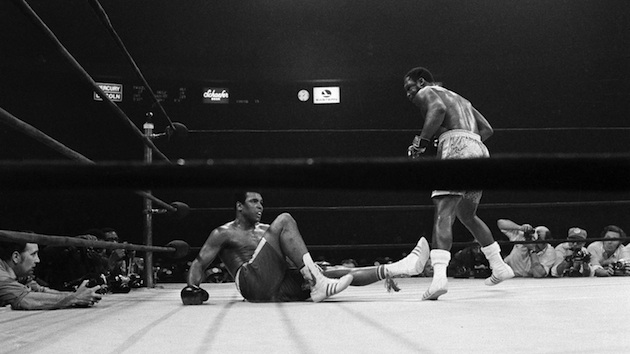

One of the greatest boxers in the world was “Smokin” Joe Frazier. Frazier was truly one of the greatest fighters ever to set foot in the ring, but there was a lot more to the man than his 37-4-1 record belied.
His true greatness came not from the boxing ring, but in how he handled adversity and his own destiny.
Frazier’s story is intertwined with another great boxer, Muhammad Ali, and his fights with “The Greatest” are some of the most memorable in history. The “Thrilla in Manila” bout with Ali in 1971 is still largely considered one of the greatest heavyweight fights in history, and it was Frazier who was the first man to ever knock Ali off his feet.
The question, of course, is what made that fight and Ali and Frazier so great?
Before his death a few years ago, Frazier often talked about how the game of boxing had changed, and he was interviewed several times on the subject of boxing and greatness. In one interview with Neil Cavuto of FOX News, he discussed the issue at length and described the actual changes to the sport as being part of the problem. He refused to accept that fighters could no longer go 15 rounds, and in making fights shorter and safer, they reduced the value of the fighter and inherently weakened the sport.
“Yah, but 15 rounds, man, we were better men for it in our day. We were stronger, we were smarter, and we were better men. Why cut them down and make them look like they can’t do the job?” Joe Frazier said on the Neil Cavuto Show.
While the risk of punch drunk and other concussion injuries plaguing aging athletes has been reduced, so has the greatness of sports. Not because we love to see athletes injured, but because the power of a sport is seeing a human being push himself to the limits of physical endurance and pain, not the bloodlust and carnage of the brawling or the carnage of the vicious impact.
It is because of this great risk that athletic competition is so great, not in spite of it. The consequence of grievous injury is risk that becomes necessary if a sport itself is to achieve greatness. If something is easy and anyone can do it, then it is no great feat.
Only through consequence can an individual or a sport achieve greatness. Without these consequences, this is no greatness. I consider that an axiom.
Greatness cannot exist without cause or consequence. When governments and laws remove the risk, danger, and yes, the excitement of a sport, they effectively neuter the greatness of the sport and reduce the combatants to mere automatons and replaceable figureheads of a castrated competition.
This is the stated goal of leftism — to equalize everything and generate fairness. This is why government touts safety. Not for the inherent benevolence of protecting sports, but to negate the greatness of a sport and thereby negate the greatness of America.
Government is doing it today not only in football, but other contact sports such as boxing and hockey. Quarterbacks are treated as glass cannons and kickoffs have been reduced to the 20 yard line dash, with little opportunity for the men that compete to really come into their own.
Worse, it puts a question mark at the end of every sentence when comparing statistics. Would Vick be as great a quarterback without the opened secondary and softer sacking rules of yesteryear? Babe Ruth hit over 700 home runs. How many would he have hit in an age of a live ball?
By not allowing the men to compete on open and even ground with their historical counterparts, we will never know.
The heart of any competitive endeavor relies on the difficulty of the accomplishment. Our society is moving more and more every day into the safety corner of the classroom rather than the battlefield of athletic competition among adults. A trophy has no value if it is given to everyone, instead of the winner.
Society protects the weak and innocent, but by extending that protection to the healthy and strong we are converting our people from men and women into cattle and sheep.
Joe Frazier knew this. The great ones always do.
Thomas Purcell is nationally syndicated columnist, author of the book “Shotgun Republic” and is host of the Liberty Never Sleeps podcast. More of his work can be found at LibertyNeverSleeps.com.
[mybooktable book=”shotgun-republic” display=”summary”]






